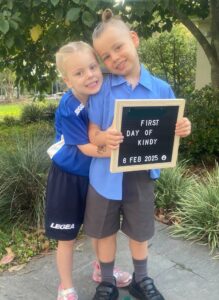While it’s a time of joy, togetherness, and celebration, the festive season can also bring unique challenges for neurodivergent children and their families. From sensory overload and changes in routine to not-so-understanding extended family members, it can be overwhelming for children and adults alike! Here at the Stronger Together Foundation, we believe in building inclusive communities where every child feels understood, comfortable, and welcome. Here are some valuable tips and tricks to help families prepare for festive events.
- Prepare your child in advance with clear communication
- Explain the event: Share details about the event, including who will be there, what activities are planned, and any sights, sounds, or smells they might encounter. Visual schedules or social stories can be effective in helping children understand what to expect. Sometimes you can find social stories online (or at least photos from previous events), or your therapist might be able to assist.
- Set expectations together: If possible, include your child in the planning process, allowing them to choose activities or let you know when they’d like breaks. Giving them a sense of control makes the experience feel more comfortable and predictable.
- Informal visits: Sometimes it can be helpful to visit a location prior to an event. For example, you could walk past the Santa photos or drive past the Christmas light display before visiting.
- Countdown calendars: Some children benefit from being able to count down to events or present-opening!
- Create a ‘safe space’ for retreat
- Identify a quiet zone: Designate a place where your child can go if they feel overwhelmed. This could be a separate room or even a quiet corner with items that help them regulate, such as noise-cancelling headphones, weighted toys, or other favourite items.
- Pack comfort items: Familiar objects like a favourite stuffed animal, fidget toys, or a comforting blanket can help reduce anxiety and provide a touchstone of familiarity amidst new environments. Even if you think your child will be fine, it’s better to be prepared. Don’t forget your child’s communication tool (e.g., visuals or AAC device) to support them in the new environment.
- Call event organisers: For larger events like Christmas carols, you can call event organisers to ask how accessible the event is. For example, the Stronger Together Foundation will be at the Glenhaven Carols on 8th December and the Mayor’s Children’s Christmas Party on 15th December with our Sensory Breakout Space.
- Consider sensory-friendly options
- Adjust lighting and sounds: For events like holiday parties, opt for soft lighting and low-volume music, or unscented candles and decorations to prevent sensory overload.
- Use ear protection: For loud events such as carols or fireworks, bring earplugs or noise-cancelling headphones to lessen auditory impact.
- Allow for flexibility and downtime
- Plan short breaks: Encourage periodic breaks throughout the event—whether it’s a few minutes outside, a quiet snack, some device time, or simply some alone time to recharge.
- Flexible participation: Give your child the freedom to join activities when they feel ready and to step back when they need a break. Allowing them this choice can make the experience more manageable and enjoyable. You could take a choice board with you that includes a ‘take a break’ visual.
- Encourage self-expression: Let them know it’s okay to take breaks or express when they’re feeling overwhelmed, reassuring them of your support and understanding.
- Keep routines as consistent as possible
- Familiar routines help support regulation: Keeping consistent mealtimes, nap times, or other routines can help children feel more stable in new environments.
- Support transitions between activities: Give your child advance notice before moving to the next part of the event to help them prepare for the transition.
- Be your child’s advocate
- Communicate your child’s needs: Let hosts or other guests know your child’s needs in advance, encouraging understanding and patience from those around them.
- Model inclusive behaviour: Set an example by creating an inclusive environment where everyone’s differences are embraced. Others are more likely to respond supportively when they see inclusive behaviours modelled.
- Respect your child’s choice to not want to engage with other people: It’s perfectly okay if they don’t feel like giving Nanna a hug!
Navigating the festive season takes some preparation, but with some empathetic planning, we can make a potentially overwhelming season as comfortable as possible for our neurodivergent children.



